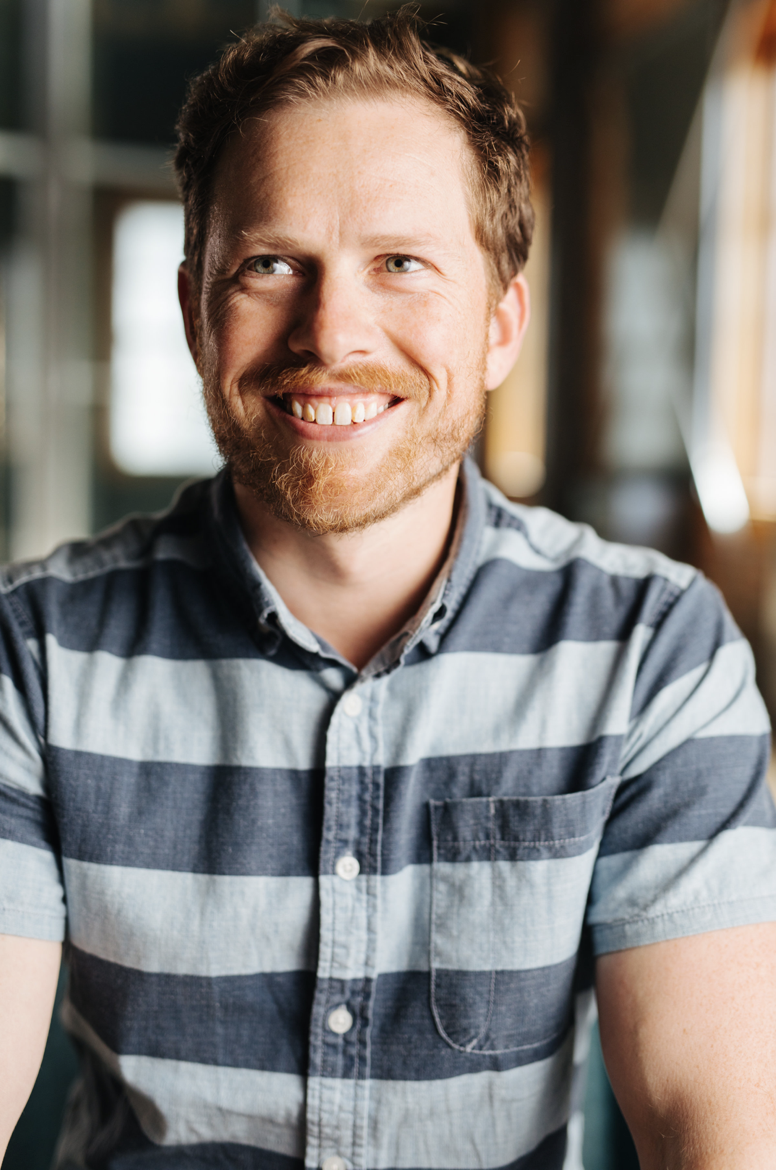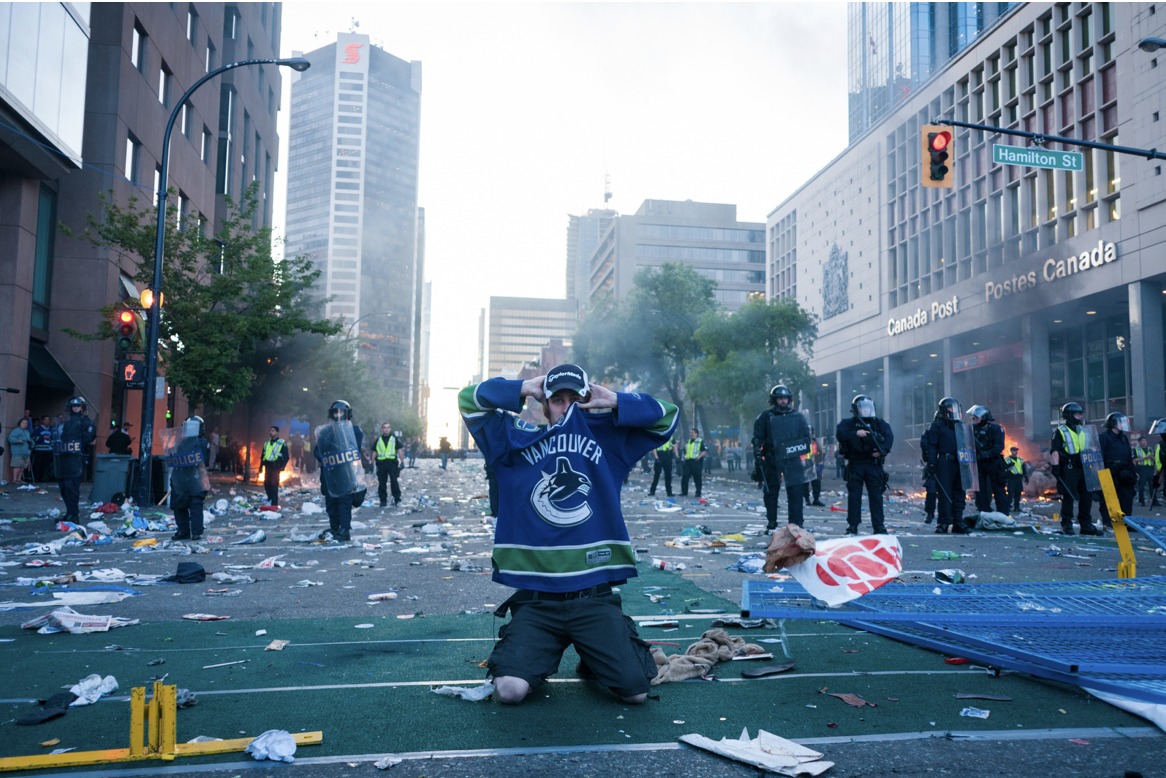History should neither be celebrated nor criticized exclusively. It should be learned from. We make discoveries. We have accomplishments but we also have terrible missteps. There are several sides to any story and often the truth lies somewhere in the middle. This is the case for Sports and Sports in Canada. A good documentary goes beyond the assumed perception and examines all the possibilities. When producing a sports-based documentary, you should cast a big net and have an open mind. Michael Grand is an experienced documentary producer who has worked with filmmaker Kathleen (Kat) Jayme for some time. Recently, they teamed up with filmmaker Asia Youngman to unravel the difficult circumstances that became the second Vancouver Canucks Riot in 2011. I’m Just Here for the Riot was most recently presented at the Calgary International Film Festival and Vancouver International Film Festival, and will soon be part of the 30 for 30 series on ESPN.
We spoke with Michael Grand to get the entire story of producing quality, successful sports documentaries in Canada.
HNMAG: When will TV viewers be able to see I’m Just Here for the Riot?
Michael Grand: It’s a 30 For 30 but ESPN hasn’t set a date yet. It’s most likely Summer 2024.
HNMAG: In your previous documentary, also written and directed by Kat, The Grizzlie Truth, Bryant “Big Country” Reeves doesn’t come up as much of a reason for why they moved to Memphis.
Michael Grand: He comes up more in our previous documentary, Finding Big Country. I think she would put that down more on the Stu Jackson ledger as he was the one who offered the huge contract. You can’t blame him for signing it, anyone would.
HNMAG: Losing the Vancouver Grizzlies was devastating to Vancouver. Anyone who was an Expos fan can relate and certainly understand what Kat was going through. Most of them are not going to root for the Washington Nationals.
Michael Grand: Yeah my dad was an excessive Expos fan, so I grew up with those games going on. The Expos were the best team in 1994 until the strike and then they were just gone.
HNMAG: This is more about the fans though. Sports can drive people in strange ways. The Vancouver Riots happened after a loss. Riots are not new to sports or even the National Hockey League (NHL). In 1986, there was a huge riot in Montreal after the Canadiens (Habs) beat the Flames to win the Stanley Cup. Four years later, when Calgary returned the favour, there were crickets in Montreal.
Michael Grand: It’s quite rare for there to be a sports riot after a loss. Usually, it’s after a win. Vancouver is unique in the circumstance and they are unique in the fact that they had two riots, both after game seven losses. They were also so far apart. The film is about the 2011 riot but you can’t talk about that without talking about the 1994 riot. Before it happened, I didn’t really feel like there was going to be a riot.
HNMAG: You mean in 2011?
Michael Grand: Yes in 2011. I didn’t live in Vancouver in 1994. I moved to Vancouver in 2005. I grew up in Edmonton and I was a big Mark Messier guy. In 1994, I was rooting for the Rangers because of him. That was like hockey heaven for me. I thought the 1994 riot would have been more of a deterrent. I also thought the police would have been super prepared for it. Regardless of your point of view or analysis, there is no denying that people were part of it who were excited to break stuff.
HNMAG: You did hear about people meeting while the game was still going on at a Skytrain on King George. They headed downtown to vandalize and loot.
Michael Grand: I take that with a grain of salt. A lot of people saying “The looters are not from Vancouver.” It’s a dismissive attitude of people living close to downtown. Definitely, people were saying that. That is all chatter. It had a big impact on me. We were on our way to the Rickshaw to see a live band. On our way down, we saw a guy in a Bruin’s Jersey get jumped and someone threw a brick through the library. That convinced us to take a huge detour to the venue. I definitely remember the fear of being close to it. It seemed like anyone could get attacked for no reason and we feared that the police could also be over-zealous. Thankfully we didn’t hear about police hurting people. The police were also frightened though.
HNMAG: Kat is a Grizzlies SuperFan. Is she also a Canucks fan or was her approach more neutral?
Michael Grand: I think it was more a proud Vancouverite swept up in something exciting happening for her city. Asia, the co-director, her and her dad used to go to Canucks games. She rooted for the team in that sense as it was a family connection. Neither of them are huge hockey fans. They both were really disgusted by the riot but equally disturbed by the way the public, social media, and regular media, somehow punished people who were involved in the riot. It was like the city and the police dropped the ball and to make up for it, we will really drag people through the mud. People were at fault for the riot but it was a bit too much.
HNMAG: Do you mean arrests through social media posts?
Michael Grand: I don’t mean the legal aspect but the online hate. People were getting mercilessly bullied and called racist and sexist names. There was a real mob mentality to the public lashing before it went through due process. That was equally as disturbing as the vandalism itself.
HNMAG: Why make a documentary about something that happened twelve years ago?
Michael Grand: It felt like this was something that was in the news and then was swept under the rug. We just moved on without really exploring what really went on. This is something really weird happening twice in your city. It feels like we are just going to blame it on a handful of troublemakers and move on. There’s something deeper here that we should explore and have a conversation on. Sometimes you are not really able to unpack all this stuff. It’s too close. In 2011, Social Media was pretty new and people posted without really thinking about it. So much has happened, so we can look at the fallout as the canary in the coal mine and the way investigations happen using social media. The way people call each other out and attack each other online. People were posting something without really thinking such as “I just flipped a cop car.” Never really considering who will see that. People didn’t have filters between their real lives and social media.
HNMAG: Vancouver isn’t known for violent sports fans but we had two scary Stanley Cup riots.
Michael Grand: That’s what’s so shocking about the Hockey riots because it’s a city like Vancouver, it’s not like a city outside of these incidents that you would expect something like this to happen.
HNMAG: It’s not very Canadian. Growing up in Edmonton, there must have been a different feeling when it came to the NHL due to their success in the 80’s.
Michael Grand: There was an embarrassment of riches with winning all those cups and then Calgary won a couple as well, Montreal was winning cups. Now it’s rare that a Canadian team wins.
HNMAG: Yes, no team based in Canada has won since 1993.
Michael Grand: Up until then it was mostly Canadian teams winning but the Canucks were never one of those. Those cities can at least point to a history of winning, even if it’s ancient history. For the Canucks to never win and to get close, it’s tough.
HNMAG: How did your relationship start with Kat?
Michael Grand: Kat and I met at the Banff World Media Festival in 2017. She was pitching Finding Big Country and I was just deciding to get into producing. She was wearing a Bryant Reeves jersey and I was really into basketball. We started chatting. She told me about the film and I immediately loved it and then within five or six months, we were in production.
HNMAG: Has I’m Just Here for The Riot screened yet?
Michael Grand: We did our World Premiere at Hot Docs which was great. We had two amazing screenings in the spring. It was also at the Calgary Film Festival. Vancouver International Film Festival and other festivals throughout the Fall and Winter.
HNMAG: How did Kat and Asia find each other for this project?
Michael Grand: Asia had her short documentary playing festivals at the same time as Finding Big Country. They met on the festival circuit. They talked about other projects and they both had the idea about a documentary about the Stanley Cup Riot. I let them know that it was a night I’d never forget. It all came about really seamlessly.
HNMAG: How did ESPN come on board?
Michael Grand: ESPN was a conversation that I had with Kat because they licensed Finding Big Country during the pandemic. We had a dialogue going already. Asia was at an event with a developer from ESPN, so Kat connected her with him. We took a lot of different meetings and then we had enough to give a proper pitch and they were on board right away. They wanted to do more content where sports are the launching point but it’s really a larger issue. What really attracted them to it was not just the mob mentality and the violence but that we were going deeper. The role that early social media played in this particular circumstance. That was a unique take. Having real rioters participate in the documentary was another selling point.
HNMAG: What gives Kat and Asia an edge as filmmakers?
Michael Grand: I don’t think many people could get participants to gain their trust as much as Kat and Asia do. They come off as genuine and empathetic without letting people off or making excuses. Here’s an opportunity to tell your story with the benefit of hindsight. There are very few people who could make others comfortable enough to share their stories. The audience gets to draw their own conclusions.
It seems like media is more polarized, opinion-based, spun, and sensationalized these days. There are twenty-four-hour news channels that tell their audiences what they want to hear.
It’s refreshing to find passionate truth-seekers who want to go beyond the accepted narrative and tell the entire story. Not put words in people’s mouths but actually listen and find out what really happened.
We learn more about who we are and how we can move forward when open our minds and pay attention.
Asia Youngman and Kathleen Jayme are filmmakers we can root for. When someone like Michael Grand comes along who shares their passion and then can produce their vision to the screen, we get something really special.


